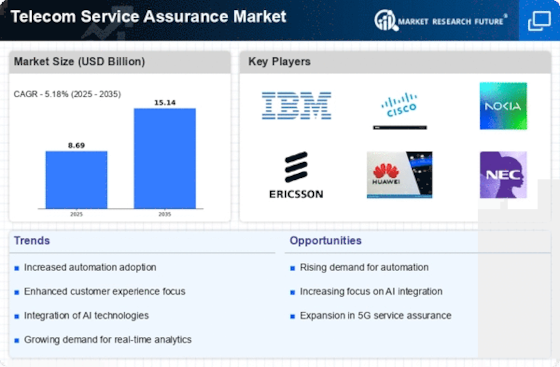Market Analysis
In-depth Analysis of Telecom Service Assurance Market Industry Landscape
Various elements shape the Telecom Service Assurance Market, which highlights the need for quality control measures aimed at attaining reliable telecommunications services throughout its existence, amongst others; some include exponential increase in data and connectivity requirements demand among others globally driven largely by advancements seen especially within Fintech innovation coupled with IoT (Internet-of-Things), blockchain technology among other initiatives geared towards digital economy transformations. One of the main drivers is the fast-growing data and connectivity demands. In a globalizing world, telecommunications service providers have to deal with intricate networks as well as increasing user expectations. The rapid development of telecom technology that features 5G networks drives the growth of the Telecom Service Assurance Market. The deployment of 5G introduces new complexities and challenges in managing network performance, ensuring low latency, and meeting the stringent quality of service (quality of service) requirements. Additionally, this trend in the adoption of service assurance results from increased complexity in telecom networks brought by a wide range of services such as voice, data, and video, among others provided by Telecommunication Operators, including IoT (Internet-of-Things) connectivity. Another important factor that influences the Telecom Service Assurance Market is how telecom service providers are customer-centric. Delivering high-quality, uninterrupted connectivity for customers experiencing increasing expectations is prioritized by telecommunication operators. These digital transformation initiatives are becoming prevalent within most telecom operators, contributing to the dynamics in their market for service assurance systems as they modernize their network architecture by adopting virtualized and software-defined infrastructure. Global network automation and artificial intelligence (AI) drive the Telecom Service Assurance Market. Automation and AI-driven analytics improve service assurance solutions by spotting problems in real time, finding potential issues beforehand, and making corrections automatically. Additionally, in the process of adopting telecom service assurance solutions, ensuring network security and compliance has become a critical consideration that enterprises must make. Sensitive information is normally transmitted through telecommunication networks; hence, it is important to ensure their security and regulatory compliance. The context of the COVID-19 pandemic on telecommunications networks highlights the relevance of service assurance solutions. The soaring demand for remote work, online education, and digital services during COVID-19 resulted in unprecedented loads on telecom companies. This demonstrates how essential these tools were to operators in handling huge traffic upsurges while maintaining high-quality network connectivity.



















Leave a Comment